Washington D.C. – In a dramatic diplomatic confrontation at the White House, the Trump Ramaphosa Meeting on Wednesday descended into controversy as U.S. President Donald Trump confronted South African President Cyril Ramaphosa with explosive false claims of white genocide and land seizures. The tense encounter, reminiscent of Trump’s February ambush of Ukrainian leader Volodymyr Zelenskiy, highlighted deep divisions over racial issues and historical injustices in South Africa.
Background Context of Trump Ramaphosa Meeting
The Trump Ramaphosa Meeting was intended by the South African president to reset his country’s relationship with the United States after a series of hostile actions by the Trump administration. Prior to the meeting, Trump had canceled much-needed aid to South Africa, offered refuge to white minority Afrikaners, expelled the country’s ambassador, and criticized the nation’s genocide court case against Israel.
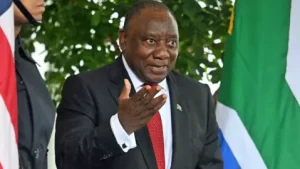
South Africa currently faces significant economic pressure from the United States, with the country confronting a 30% tariff under Trump’s currently suspended raft of import taxes. The U.S. serves as South Africa’s second-biggest trading partner, making the Trump Ramaphosa Meeting crucial for bilateral economic relations.
Ramaphosa arrived at the White House prepared for an aggressive reception, strategically bringing popular white South African golfers as part of his delegation and stating his intention to discuss trade relationships during the Trump Ramaphosa Meeting.
Oval Office Confrontation During Trump Ramaphosa Meeting
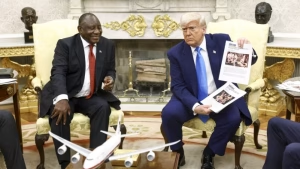
The Trump Ramaphosa Meeting quickly transformed into a carefully choreographed Oval Office onslaught as Trump immediately pounced on his prepared list of concerns about the treatment of white South Africans. The American president punctuated his allegations by playing a controversial video and leafing through a stack of printed news articles that he claimed proved his accusations.
With the lights dimmed at Trump’s specific request during the Trump Ramaphosa Meeting, a television that is not normally set up in the Oval Office displayed what Trump asserted were white crosses marking the graves of white people. The video also featured opposition leaders making incendiary speeches, with Trump suggesting that one of them, Julius Malema, should be arrested.
Also Read: Russia Ukraine Negotiations: A Breakthrough Following Trump-Putin Call
However, the video shown during the Trump Ramaphosa Meeting was actually made in September 2020 during a protest after two people were killed on their farm a week earlier. The crosses did not mark actual graves but rather represented farmers who had been killed over the years, according to an organizer who spoke to South Africa’s public broadcaster at the time.
White Genocide Claims Dominate Trump Ramaphosa Meeting
During the Trump Ramaphosa Meeting, Trump made several unsubstantiated claims about persecution and genocide affecting white South Africans. “We have many people that feel they’re being persecuted, and they’re coming to the United States,” Trump declared. “So we take from many locations, if we feel there’s persecution or genocide going on,” he added, referring specifically to white farmers.
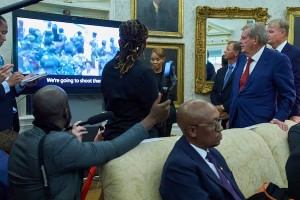
The president continued his allegations during the Trump Ramaphosa Meeting, stating, “People are fleeing South Africa for their own safety. Their land is being confiscated, and in many cases, they’re being killed.” These claims echo a once-fringe conspiracy theory that has circulated in global far-right chat rooms for at least a decade with vocal support from Trump’s ally, South African-born Elon Musk, who was present in the Oval Office during the meeting.
Statistical Reality Contradicts Trump’s Claims
The reality of crime statistics in South Africa directly contradicts the allegations made during the Trump Ramaphosa Meeting. While South Africa does have one of the highest murder rates in the world, the overwhelming majority of victims are Black, not white as Trump suggested.
According to official data, South African police recorded 26,232 murders nationwide in 2024, with only 44 linked to farming communities. Of those farming-related deaths, merely eight victims were actual farmers, undermining the genocide narrative presented during the Trump Ramaphosa Meeting.
Ramaphosa’s Composed Response During Trump Ramaphosa Meeting
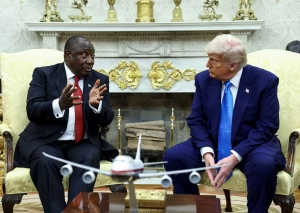
Throughout the Trump Ramaphosa Meeting, President Ramaphosa maintained remarkable composure while sitting in a chair next to Trump. He pushed back against the false claims with measured responses, demonstrating diplomatic skill under pressure.
“If there was Afrikaner farmer genocide, I can bet you, these three gentlemen would not be here,” Ramaphosa said during the Trump Ramaphosa Meeting, referring to golfers Ernie Els and Retief Goosen and billionaire Johann Rupert, all white South Africans who were present in the room.
This logical argument, however, did not satisfy Trump during the Trump Ramaphosa Meeting. “We have thousands of stories talking about it, and we have documentaries, we have news stories,” Trump insisted. “It has to be responded to.”
Land Reform Discussion in Trump Ramaphosa Meeting
The Trump Ramaphosa Meeting also addressed South Africa’s controversial land reform policies. Trump displayed printed copies of articles that he claimed showed white South Africans who had been killed, saying “death, death” as he flipped through them before handing them to his counterpart.
When Ramaphosa explained that crime affected all South Africans and that the majority of victims were Black, Trump interrupted during the Trump Ramaphosa Meeting, saying, “The farmers are not Black.” Ramaphosa diplomatically responded, “These are concerns we are willing to talk to you about.”
South Africa’s new land reform law, aimed at redressing apartheid injustices, allows for expropriations without compensation when in the public interest, such as when land lies fallow. However, no such expropriation has actually taken place, and any order can be challenged in court.
Historical Context and Diplomatic Tensions
During the Trump Ramaphosa Meeting, the South African president attempted to invoke Nelson Mandela’s example as a peacemaker, but this did not move the U.S. president, whose political base includes white nationalists. The myth of white genocide in South Africa has become a rallying point for far-right movements in the United States and elsewhere.
Trump acknowledged apartheid’s horrors during the Trump Ramaphosa Meeting, noting, “I will say: apartheid, terrible. This is sort of the opposite of apartheid.” This comment revealed his fundamental misunderstanding of post-apartheid South Africa’s efforts to address historical injustices.
Elon Musk’s Presence and Influence
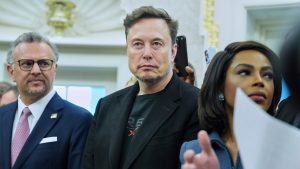

The Trump Ramaphosa Meeting featured the notable presence of Elon Musk, the South African-born billionaire who has vocally supported conspiracy theories about white persecution in his birth country. Musk’s attendance underscored the influence of far-right narratives on American foreign policy discussions.
Business tycoon Johann Rupert later stepped in during the Trump Ramaphosa Meeting to support Ramaphosa’s position, explaining that crime was a widespread problem affecting all racial groups, with many Black people also dying. He strategically mentioned Musk by suggesting that Starlink telecommunications systems were needed in every South African police station to combat crime.
Diplomatic Strategy and Composure
Unlike Ukrainian President Zelenskiy, who sparred with Trump and Vice President JD Vance during their White House meeting and ended up leaving early, Ramaphosa maintained his diplomatic composure throughout the Trump Ramaphosa Meeting. He praised Trump’s decor, noting the president’s gold accessories in the Oval Office, and expressed anticipation about handing over the Group of 20 presidency next year.
Trump declined to commit to attending the G20 meeting scheduled for South Africa in November during the Trump Ramaphosa Meeting.
Post-Meeting Damage Control
Following the contentious Trump Ramaphosa Meeting, President Ramaphosa attempted to refocus attention on economic cooperation. He told reporters that the two countries had agreed to discuss critical minerals in South Africa, while his trade minister revealed that the government had submitted a trade and investment proposal that included purchasing liquefied natural gas from the United States.
However, Ramaphosa also felt compelled to directly address the false allegations made during the Trump Ramaphosa Meeting. “There is just no genocide in South Africa,” he stated flatly, categorically denying Trump’s claims about racial violence against white farmers.
The Trump Ramaphosa Meeting ultimately highlighted the challenges facing diplomatic relations between the two nations, with conspiracy theories and racial tensions overshadowing legitimate economic and strategic discussions that could benefit both countries.

